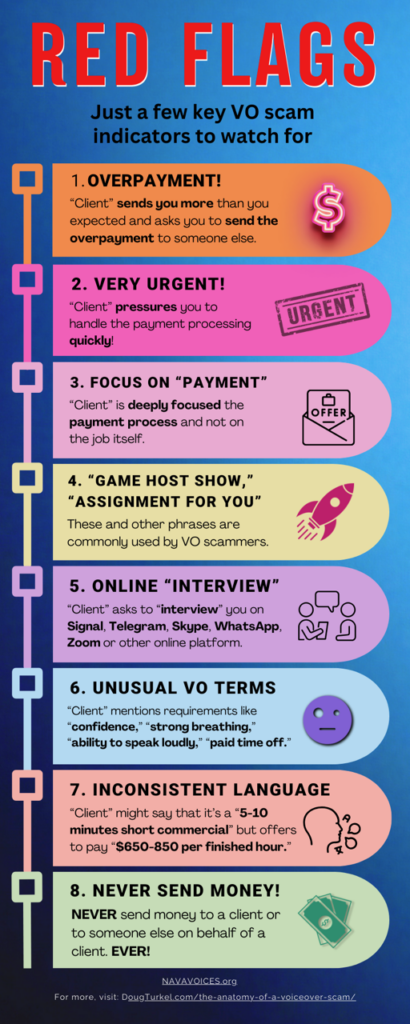Protect Yourself from Voiceover Scams
Learn to spot the one red flag that will keep you safe.
Written by Doug Turkel
anatomy of a voice over scam
Voice over scams aren’t going away, but protecting yourself from the vast majority of them is as easy as following One. Simple. Rule. And we’ll get to it. But first, let’s discuss the basics of these scams and give you some tools that will help keep you from getting ripped off.
You see, most of the scams that target voice talent are some version of the classic Overpayment Scam. This scam has nothing to do with voiceovers, and everything to do with getting you to send money to the scammers. And the way they set things up, they want you to believe that the money you’re sending them is theirs to begin with, and that you’ve got nothing at risk. That, of course, is NOT the case.
So that you can be familiar with the mechanics of the scam, here’s a general overview of what it often looks like.
Learn how to Spot the Scam and Protect Yourself

01
Overpayment
"Client" sends you more than you expected and asks you to send the overpayment to someone else.
After a very brief conversation involving the promise of work, the scammer sends you money (usually in the form of a forged check). They might claim that the money is partial payment for the job, or that they want you to use it to buy equipment for the (non-existent) session. In this version of the scam, the check is accidentally (totally on purpose) made out for more than they owe you. Then they might ask you to send the “Overpayment” back to them. They might also ask you to send the “excess” amount to a third party, (or to their “approved vendor” to pay for equipment), but of course, the money is still going back to the scammer. Often via wire transfer or money order, and sometimes by store gift card, making it nearly impossible to retrieve your money.
02
very urgent
They’ll be very eager for you to let them know when you’ve received the check, because their time is limited. They need for you to send them their profit before your bank flags the check as fake, which can take as little as a few days or as much as a few weeks.
The check might clear your bank in a day or two, allowing you to withdraw the check amount, but that doesn't mean that the check is necessarily legitimate
And if you’ve sent any amount of money back to the scammers, you’ll be responsible for repaying that amount to your bank. So pay attention to the urgency and pressure tactics.
That's a RED FLAG
03
focus on "payment"
You’ll also notice that at this point, the scammers are only interested in talking about the payment, and that there is zero talk about the gig.
That's a RED FLAG
The basic structure of the Overpayment Scam is always the same: they send you what looks like too much money, and they find some justification for having you return or forward the excess.
04
"game host show"
"assignment for you"
These and other phrases are commonly used by VO scammers
It’s the opening move in this scam that can be tougher to spot, because there are many different approaches. We’ve already discussed the most common versions, often described as the Game Show Host scam or the Rocket Scientist scam. That’s because the script samples in their early emails or texts contain those phrases. This version often opens with a promise of work that can look like this: “I have a $850 voice over (Assignment) for you.”
That's a RED FLAG
Newer opening gambits have also been spotted recently. In some, the scammers use the name of an established company – and the names of real employees there – in order to lend credibility to their pitch. But because the scammers don’t actually work for the company, they’re forced to use a different email provider, often using GMail or Outlook addresses.
That's a RED FLAG
05
online "interview"
Sometimes the scammers will invite you to “interview” for a job, asking to connect with you through messaging apps like Signal, Telegram, Skype, WhatsApp or Zoom.
That's a RED FLAG
06
Unusual VO terms
"Client" mentions requirements like "confidence," strong breathing," "ability to speak loudly," "paid time off."
With these newer versions of the scam, pay some attention to their communication, and you’ll notice even more red flags. They’ll often mention things that simply don’t make sense when it comes to freelance voiceover work, like “Generous paid time off” or promises of “a flexible vacation schedule.”
That's a RED FLAG
You’ll also see overly simplistic descriptions of the “job requirements,” with the scammers asking you to confirm that you have “Confidence,” “Strong breathing” and the “Ability to speak loudly and clearly so the audience easily understands the intention of the commercial.”
That's a RED FLAG
07
inconsistent language
Non-sequiturs, too, like saying that they’d like to hire you for a “5 – 15 minutes short commercial,” but offering to pay “$650 – $850 per finished hour.”
That's a RED FLAG
08
one simple rule
So how do you protect yourself from being taken?
Lots of warnings about these scams suggest that you watch out for broken English in any outreach you receive, or the use of the word “kindly.” But it’s not uncommon to receive emails from potential clients who speak English as a second language, or even clients who genuinely use the word “kindly.”
Folks warning you about the scam will also share the name that the scammer uses in their email. That can be helpful, but since the scammers often change the names they use, keeping up to date can be extremely difficult. And with many scammers using the names of real people and real companies for added credibility, that challenge becomes even more difficult.
So here’s the bottom line...that one simple rule that can keep you from becoming a victim of the Overpayment Scam: Never, NEVER send money to a client or for a client.
After more than three decades of doing voiceover (yes, I started really young) there has never been a situation in which I needed to send money to a client, or to anyone else, on behalf of a client. That’s just not how things work.
Stay safe out there, and break a lip!
Doug Turkel has been voicing and producing commercials for clients large and small since demos were on cassette. His everyman sound has helped him become the voice of more than 15,000 commercials (really!), thousands of corporate and e-learning projects, a bunch of radio stations, and even a couple of TV networks. His strong belief in the power of consistent, proactive marketing have helped him and his ‘UNnouncer’ branding develop a solid roster of regular clients.

